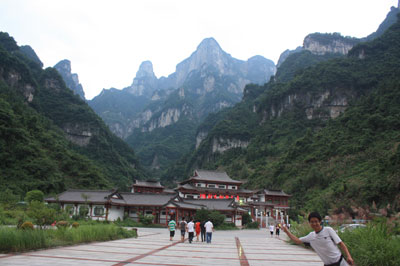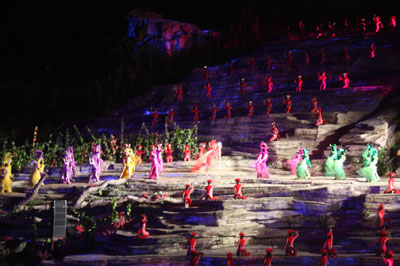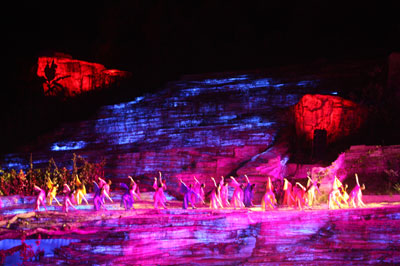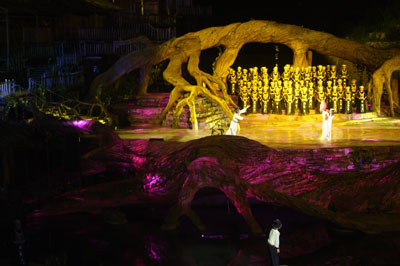Attending a concert, play, opera, ballet…
This item appears on page 46 of the December 2012 issue.
We asked any of you who attended a concert, a recital or any music or dance performance or stage production outside of the US in the last couple of years to tell us how you learned about it and how you obtained tickets. The responses this month, comprising part nine in this ongoing series, are about events attended in China.
Prior to a tour of rural China in October 2011, I had some spare time in KUNMING. The guide suggested that she accompany me to an evening performance of song and dance called “Shangri-La Dynamic Yunnan” at Kunming Auditorium (tickets at most local travel agencies and hotels). I agreed.
I paid CNY400 (about $64) for the most expensive ticket, then proceeded to my front-row center seat. There was an announcement about photography not being allowed during the performance.
Large screens on both sides of the room explained the subject of each dance, including Creation, The Sun, The Land, Pilgrimage and Spirit of the Peacock. These are based on the religious beliefs of the Yunnan people. Everything was done in Chinese and English.
The cast was composed of at least 100 very talented young people of different Chinese minorities. The colorful costumes and makeup were gorgeous. There wasn’t one slow minute.
The show was my best evening of my entire stay in China.
Afterward, I hired a taxi at a cost of about $12. We dropped the guide off at her home. I also gave her a 10-dollar tip, which is a lot in China. I then rode on to my hotel.
Joyce Bruck
Ocean Ridge, FL
Having traveled to mainland China three times, we wanted to venture away from the mainstream tourist attractions and experience some of the country’s national parks and mystical mountainous regions, places popular with the Chinese people, themselves.
We visited (June 27-July 3, 2011) what turned out to be one of our favorite areas of China, Zhangjiajie National Forest Park, in the northwest part of Hunan province. In the park, visitors travel by bus, cable car and on foot to some of the most magical settings on Earth.
The park’s Yuanjiajie Scenic Area, with its valley of quartz-sandstone pillars, inspired the “floating mountains” scenes in the movie “Avatar.” With our guide, we had a breathtaking day hiking on walkways suspended from the sheer cliffs of Yuanjiajie Mountain while enjoying a respite from the heat and humidity of the lower elevations. From the platform on its summit, we looked down on the 3,544-foot-tall pillar now called Avatar Hallelujah Mountain (aka Southern Sky Pillar).
From the Tianzi Mountain Scenic Area, we had taken a 40-minute bus ride up Yuanjiajie Mountain on a curvy road, but, after hiking, we came down via the Bailong glass elevator; two-thirds of the ride was outdoors and the last third was through the mountain. At the bottom, a public bus takes visitors back to the entrance of the national park.
On another day we did more trekking on nearby Tianmen Mountain (4,982 feet), which we reached by taking one of the longest cable car rides in the world. From its starting point in Zhangjiajie City to its culmination in the clouds of Tianmen Mountain, the ride takes 30 minutes.
One evening we indulged ourselves in a very special treat: a performance like none we had ever seen at an outdoor theater like none we had ever seen.
Situated at the base of Tianmen Mountain is an outdoor amphitheater, the Grand Theater of Tianmenshan Valley. It is located in an enchanting natural setting perfect for the musical performance of a dramatic Hunan folktale, a love story between a goddess-like “fox lady” and a poor but happy woodsman.
The audience faced the majestic peaks of Tianmen Mountain, its lush green forested foothills forming a backdrop to the action of the play. A lake and a stream, part of the set, were in the foreground, and a traditional Tujia village had been built on the steep hillside to the left of the staging area. Cast members also performed on the rocky cliffs to the right.
Mist and fog were used, and, in one act, realistic-looking snowflakes came floating down onto the audience.
The music was not live but piped in, but one would hardly have noticed because of the awesomeness of every other element of this production.
The music ranged from loud and dramatic scores to sweet folk songs. There was a lot of live percussion; at one point, drummers lined up across the stage, dancing as they drummed. It was fantastic.
The cast of over 500 included hundreds of singers with breathtaking voices plus dancers in costume. The choreography was beautiful, and the lighting and colors were incredible.
Toward the end of the play, the two lovers, standing on adjacent mountain peaks, turned to stone to live side by side for eternity. We won’t give away any surprises, but, just when we thought we had seen it all, a huge round moon was made to slowly rise from behind them.
We learned about the production through our private guide. He secured tickets for us at a booth a few blocks from the theater, but you can also buy them at the theater*. We paid 180 yuan ($28) for the two tickets.
The open-air performance was not in English, but the story was simple, and the English brochure and a video screen off to the side with English subtitles told us basically what we needed to know. Photography and videography were allowed during the performance. Casual dress was fine.
We attended a few theatrical productions in China, and each began with an art auction that lasted a good 30 minutes. While initially “different” and interesting, the novelty of this quickly wore off as we became impatient and anxious for the performance to start.
Our advice to those attending a performance in China is to not feel self-conscious if people watch you more than they watch the performance! Just greet any stares with a big smile and you can almost be guaranteed smiles back. We are convinced that the path to world peace starts with a smile!
Phyllis & David Stolls
Riverside, CA
*According to the Zhangjiajie City Information Center (phone +86 744 8297777 or e-mail shuire@zhangjiajie.gov.cn), the drama “Tianmen Fox Fairy” is performed “nightly except in harsh winter.” Tickets are available at most local travel agencies and hotels.




